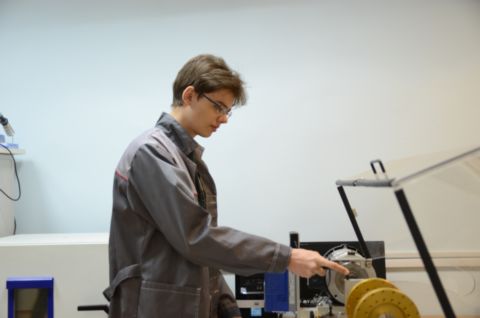Sergei Krylov, a 10th-form pupil of Lyceum No.77, has taken the first places in the Big Challenges and the 21st Century Intellectuals contests for developing a neural network-based method for diagnosing the condition of bearings. The SUSU Laboratory for Self-Validating Sensors, Systems, and Advanced Instrumentation offered equipment for obtaining data on vibration signals from bearings and provided methodological support for the project.
Testing facility, provided by the university, was used to conduct the research at the SUSU Laboratory for Self-Validating Sensors, Systems, and Advanced Instrumentation. Using this testing facility, the young researcher obtained data on vibration signals with different types of failures of the tested rolling bearings: with damage to the inner ring, outer ring, rolling element and combined damage.
“When receiving data from the facility, we converted the vibration signals of the bearings into SDP images using code written in the MATLAB program. The process of converting the vibration signals into SDP images is described using formulas. The method does not require time-frequency analysis and works only with signals in the time domain; therefore, it has the advantages of simplicity, convenience and fast calculation,” explained Sergei Krylov.

The obtained images with a resolution of 128x128 pixels served as the basis for training a convolutional neural network (CNN). This is a special type of neural networks used for image recognition. The neural network learnt to recognize normal bearing signals from bearing signals with damage with an accuracy of 98%, as well as to determine the types of damage with an accuracy of 95%.
“We are ready to provide support to everyone who is ready to work thoroughly in our field: technical self-diagnostics and self-monitoring of devices and systems. Every day, SUSU is playing an increasingly important role in the life of our region, becoming an expert and decision-making centre elaborating new programs for the development of the region. Our university is open to collaboration with representatives of all walks of life. The assistance we provide in technical research is an investment in the future, in the development of the laboratory and the university,” said Olga Ibryaeva, senior research fellow of the SUSU Laboratory for Self-Validating Sensors, Systems, and Advanced Instrumentation.
The Big Challenges All-Russian Contest of Scientific and Technical Projects is a good start for school pupils and students to their future career in science. Winners and prize-winners are included in the State Information Resource on People with Outstanding Abilities, which will help them in the future to qualify for grants from the President of the Russian Federation. Also, the winners receive additional points when enrolling in universities in our country. The contest is organised in 13 areas: from research in the field of genetics to space technology.
The 21st Century Intellectuals is an open city-wise contest of research and design works among the 9th- to 11th-form pupils. The event is held at the universities of our city, such as SUSU, CSU and RANEPA as part of the implementation of the Concept of the Russian Nationwide System for Identifying and Developing Young Talents, and the municipal component of the “Success of Every Child” and “Social Activities” regional projects and the reporting session of the Student Scientific Society “We Are the Creators of All Things New!”.
Sergei Krylov from MAEI “Lyceum No. 77 of the City of Chelyabinsk” was guided by his Mathematics teachers Tatiana Kamaltdinova and Olga Shaldina.
South Ural State University is a university of transformations, where innovative research is conducted in most of the priority fields of science and technology development. In accordance with the strategy of scientific and technological development of the Russian Federation, the university is focused on the development of big scientific interdisciplinary projects in the field of digital industry, materials science, and ecology. In 2021 SUSU became the winner in the competition under the Priority 2030 program. The university acts as a regional project office of the World-class Ural Interregional Research and Education Centre (UIREC), which is aimed at solving the tasks of the Science and Universities National Project.




